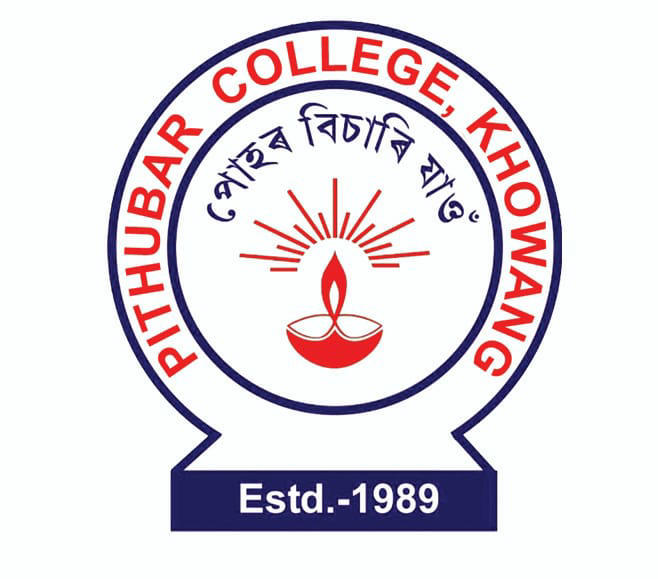
- pithubarcollegekhowang@gmail.com
- Call Us: +91-9957246160

- pithubarcollegekhowang@gmail.com
- +91-9957246160


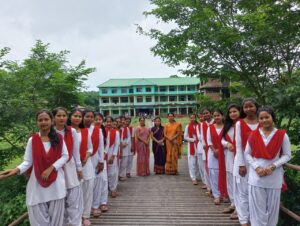
Pithubar Girls’ Degree College was established in the year 1989 and look after a very dedicated personality Sri Dimbeswar Chetia as founder Principal. The same year Sociology was introduced as Pass Course (Non-Major). Now the department provide both Honours (Major) and Non-Honours Course. Three well qualified faculty always works towards for all round development of the department. At present the department has 58 Nos. of Honours students and 90 Nos. of Non-Honours students. The department has Highest students strength in the college.
From 2014 to 2021, 15 Nos. of students had achieved First Class and maximum no. of students were able to acquire Second Class. In the year 2022, first CBCS batch have completed in B. A. programme . Apart from the Sociology department ,one student got A+, 3 students got A and 13 Nos. of students got B+. In this year, Department of Sociology scored top among all the departments of the college.
The department has a Wall Magazine named “JNANAMUDRANI” where students of the department contribute their writings. The department also have a library which is one of the source of knowledge.
The department also organized seminar, workshop ,various educational tours and field study for Research Survey for teacher-student interaction.
Welcome to the Department of Sociology of Pithubar Girls’ Degree College, Khowang, Dibrugarh. The Department of Sociology was started in 1989 with a mission to offer both the students and faculty an opportunity and environment to engage with plurality of visions.
The Sociology Department works from the very beginning with the objective in helping the students to learn and develop their knowledge and also achieve their goals.
The Department tries to provide a suitable environment for students that they can build and develop their skills. We, the department of Sociology always motivate students by arranging seminar, workshop, group discussion and also encourage to present their papers. The department further encourage the students to be seekers of information, knowledge and wisdom.
Apart from this, the department also encourage students to participate in various activities inside and outside the college, making their overall college experience fun and fruitful. The department always try to do the best and try to taking the department to next level.
To conclude this message let me extend a warm welcome to all. I am proud to be part of Sociology Department.
Thank You.
Mrs. Nabanita Phukon
Assistant Professor
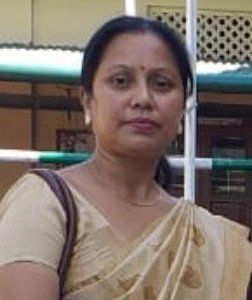
Qualification: MA. SET
Designation: Asst. Prof. & HoD
Department: Sociology
6003972156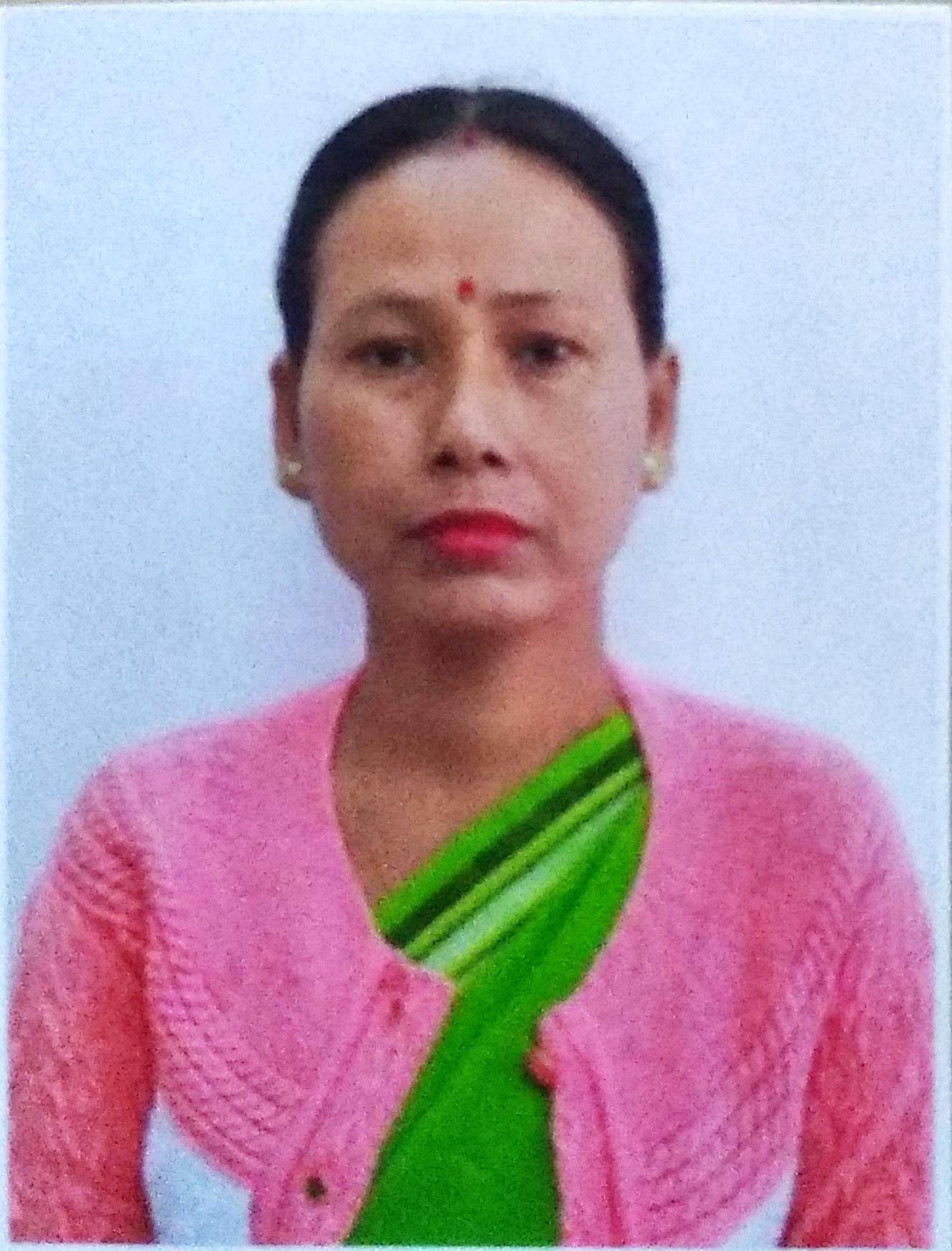
Qualification: MA.SET
Designation: Assistant Professor
Department: Sociology
8399087496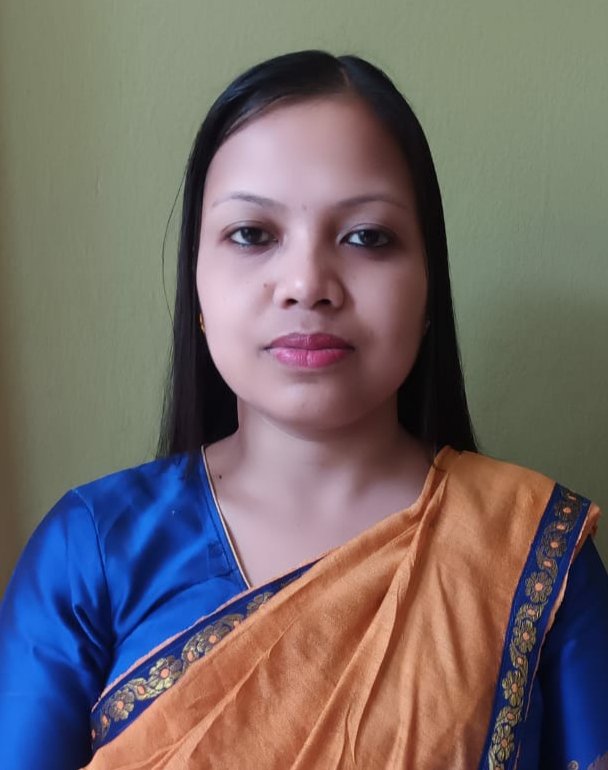
Qualification: MA, NET
Designation: Guest Lecturer
Department: Sociology
8638806645Pithubar Girls’ Degree College offers Three year Degree course. The students after successful completion of the programme are given the Bachelor Degree. As the college offers programme in arts stream only, so the Degree they are conferred is Bachelor of Arts (B.A). It is expected that after obtaining the B.A. Degree, students become eligible to pursue higher studies such as P.G. Courses. Besides, after passing the B.A. the students become eligible to face competitive examination and such others. The programme is offered in semester system. The odd and even semester comprise a year. The Choice Based Credit System (CBCS) has been implemented from the session 2019-20.
The Department of Sociology, under Dibrugarh University now offers three year degree course strictly adhere to the CBCS pattern. The goal of this course is to produce competent, skilled people who can employ and implement their knowledge in various sectors. After completion of this course following program outcome comes from the students of Sociology.
Program Specific Outcome :
C-1: INTRODUCTION TO SOCIOLOGY – I ∙ Introduce diverse to divers form of trainings and capabilities. ∙ Introduce to a sociological way of thinking. ∙ It also provides a foundation for the other more detailed and specialized courses in sociology.
C-2: Sociology of India – I ∙ The processes and modes of construction of knowledge of India. ∙ The key concepts and institutions which are useful for the understanding of Indian society.
Generic Elective G E 01: Indian Society: Images and Realities ∙Introduce with Indian society.
SEMESTER IIC-3: Introduction to Sociology II ∙ Introduce with sociological thought. ∙ To know how over a period of time thinkers have conceptualized various aspects of society. ∙ It will also provide a foundation for thinkers in the other papers.
C-4: Sociology of India – II ∙ The variety of ideas and debates about India. ∙ To engage with the multiple socio-political forces and ideologies which shape the terrain of the nation.
GE 02: Family and Intimacy ∙ The concept of family. ∙ A range of contemporary concerns pertaining to this institution from a sociological perspective and with an interdisciplinary orientation.
SEMESTER IIIC-5: Political Sociology ∙ The major theoretical debates and concepts in Political Sociology, while situating these within contemporary political issues. ∙ To developing a comparative understanding of political relationships through themes such as power, governance and state and society relationships.
C-6: Sociology of Religion ∙ To understanding of religious over individual religions. ∙ The linkage between social and religious through different registers mentioned in the outline.
C-7: Sociology of Gender ∙ Introduce with gender as a critical sociological lens of enquiry in relation to various social fields. ∙ To interrogate the categories of gender, sex, and sexuality.
GE 03: Rethinking Development ∙ The ideas of development from a sociological perspective. ∙ The different approaches to understanding development and traces the trajectory of Indian experience with development from an interdisciplinary perspective.
Skill Enhancement Course: SEC 01: Reading, Writing and Reasoning for Sociology ∙ The survival techniques for developing literacy in academic language. ∙ To tackle text-related tasks with confidence.
SEMESTER IVC-8: Economic Sociology ∙ The social and cultural bases of economic activity. ∙ The significance of sociological analysis for the study of economic processes in local and global contexts.
C-9: Sociology of Kinship ∙ The general principles of kinship and marriage by reference to key terms and theoretical statements substantiated by ethnographies. ∙ The trajectories and new directions in kinship studies.
C-10: Social Stratification ∙ Sociological Study of Social Inequalities. ∙ The principal theoretical perspectives on and diverse forms of Social inequality in articulation with each other.
GE 04: Gender and Violence ∙ The logic of violence, awareness of its most common forms. ∙ Be equip with sociologically.
SEC 02: Ethnographic Filmmaking ∙ Introduces with film techniques as a form and method of description and argument ∙ It enables students to make comparison between film and the written mode as ethnography.
SEMESTER VC-11: Sociological Thinkers –I ∙The discipline of sociology through selected texts by the major thinkers.
C-12: Sociological Research Methods – I ∙ The methodologies of sociological research methods. ∙ Some elementary knowledge of the complexities and philosophical underpinnings of research.
DSE Papers (Choose Two)DSE 01: Urban Sociology ∙ The theoretical perspectives for understanding urban life in historical and contemporary contexts. ∙ The complexities of urban living with case studies from India and other parts of the World.
DSE 02: Agrarian Sociology ∙ The traditions of enquiry and key substantive issues in agrarian sociology. ∙ Introduce with emerging global agrarian concerns.
DSE 03: Environmental Sociology ∙ The core debates of environmental Sociology, different approaches within the sub‐discipline and how these approaches may be used to understand environmental issues and movements in India.
DSE 04: Sociology of Work ∙ The idea that though work and production have been integral to societies through time, the origin and spread of industrialization made a distinct rupture to that link. ∙ To know how values and ideals of pluralized industrialism(s) have caused an absorbed multiple transformative shifts to the local and global social networks of the contemporary world.
SEMESTER VIC-13: Sociological Thinkers II ∙ Introduce with post-classical sociological thinking through some original texts.
C-14: Research Methods II ∙ To know that how research is actually done. ∙ Some elementary knowledge on how to conduct both, quantitative and qualitative research through formulating research design, methods of data collection, and data analysis.
DSE Papers (Choose Two)DSE 05: Sociology of Health and Medicine ∙ Introduce the sociology of health, illness and medical practice by highlighting the significance of socio-cultural dimensions in the construction of illness and medical knowledge.
DSE 06: Indian Sociological Traditions ∙ Introduce the Sociologist in India have primarily been engaged with issues of tradition and modernity, caste, tribe and gender. ∙ Introduce the perspectives of key Indian sociologists on some of these issues.
DSE 07: Visual Culture ∙ The construction of ’seeing‘as a social process. Students will able to engage with case studies covering various visual environments which allow a scope to contextualize everyday visual culture within larger social debates around power, politics, identity and resistance.
DSE 08: Reading Ethnographies ∙ To read ethnographic texts in their entirety.
DSE 09: Societies in North East India ∙A Sociological understanding of Societies in North East India. Students will able to grow a sociological understanding of the specificity of world views.

Pithubar Girls’ Degree College was established in the year 1989 and look after a very dedicated personality Sri Dimbeswar Chetia as founder Principal. The same year Sociology was introduced as Pass Course (Non-Major). Now the department provide both Honours (Major) and Non-Honours Course. Three well qualified faculty always works towards for all round development of the department. At present the department has 58 Nos. of Honours students and 90 Nos. of Non-Honours students. The department has Highest students strength in the college.
From 2014 to 2021, 15 Nos. of students had achieved First Class and maximum no. of students were able to acquire Second Class. In the year 2022, first CBCS batch have completed in B. A. programme . Apart from the Sociology department ,one student got A+, 3 students got A and 13 Nos. of students got B+. In this year, Department of Sociology scored top among all the departments of the college.
The department has a Wall Magazine named “JNANAMUDRANI” where students of the department contribute their writings. The department also have a library which is one of the source of knowledge.
The department also organized seminar, workshop ,various educational tours and field study for Research Survey for teacher-student interaction.
Welcome to the Department of Sociology of Pithubar Girls’ Degree College, Khowang, Dibrugarh. The Department of Sociology was started in 1989 with a mission to offer both the students and faculty an opportunity and environment to engage with plurality of visions.
The Sociology Department works from the very beginning with the objective in helping the students to learn and develop their knowledge and also achieve their goals.
The Department tries to provide a suitable environment for students that they can build and develop their skills. We, the department of Sociology always motivate students by arranging seminar, workshop, group discussion and also encourage to present their papers. The department further encourage the students to be seekers of information, knowledge and wisdom.
Apart from this, the department also encourage students to participate in various activities inside and outside the college, making their overall college experience fun and fruitful. The department always try to do the best and try to taking the department to next level.
To conclude this message let me extend a warm welcome to all. I am proud to be part of Sociology Department.
Thank You.
Mrs. Nabanita Phukon
Assistant Professor

Qualification: MA. SET
Designation: Asst. Prof. & HoD
Department: Sociology
6003972156

Qualification: MA.SET
Designation: Assistant Professor
Department: Sociology
8399087496

Qualification: MA, NET
Designation: Guest Lecturer
Department: Sociology
8638806645
Pithubar Girls’ Degree College offers Three year Degree course. The students after successful completion of the programme are given the Bachelor Degree. As the college offers programme in arts stream only, so the Degree they are conferred is Bachelor of Arts (B.A). It is expected that after obtaining the B.A. Degree, students become eligible to pursue higher studies such as P.G. Courses. Besides, after passing the B.A. the students become eligible to face competitive examination and such others. The programme is offered in semester system. The odd and even semester comprise a year. The Choice Based Credit System (CBCS) has been implemented from the session 2019-20.
The Department of Sociology, under Dibrugarh University now offers three year degree course strictly adhere to the CBCS pattern. The goal of this course is to produce competent, skilled people who can employ and implement their knowledge in various sectors. After completion of this course following program outcome comes from the students of Sociology.
3). Opportunity to provide higher education in social science.
4). Enriching the young students with knowledge of society at a higher level.
5).The programme seeks to develop in students the sociological knowledge and skills .
6). The ability to apply sociological concepts and theories to the real world.
Program Specific Outcome :
1). Providing scope for employment of students in different sectors.
2). Preparing future teachers in Sociology in different teaching levels.
3). Educated the students of Sociology and provide them opportunity to get firsthand knowledge of society.
4). Providing students knowledge to carry out research and understand society in depth.
5). Develop sociological understanding.
6). Students of sociology stream have to work beyond the class room boundary at the time of field study activities. As a result good communication skill develops while interacting with local people.
SOCIOLOGY(HONOURS)
SEMESTER I
C-1: INTRODUCTION TO SOCIOLOGY – I ∙ Introduce diverse to divers form of trainings and capabilities. ∙ Introduce to a sociological way of thinking. ∙ It also provides a foundation for the other more detailed and specialized courses in sociology.
C-2: Sociology of India – I ∙ The processes and modes of construction of knowledge of India. ∙ The key concepts and institutions which are useful for the understanding of Indian society.
Generic Elective G E 01: Indian Society: Images and Realities ∙Introduce with Indian society.
SEMESTER II
C-3: Introduction to Sociology II ∙ Introduce with sociological thought. ∙ To know how over a period of time thinkers have conceptualized various aspects of society. ∙ It will also provide a foundation for thinkers in the other papers.
C-4: Sociology of India – II ∙ The variety of ideas and debates about India. ∙ To engage with the multiple socio-political forces and ideologies which shape the terrain of the nation.
GE 02: Family and Intimacy ∙ The concept of family. ∙ A range of contemporary concerns pertaining to this institution from a sociological perspective and with an interdisciplinary orientation.
SEMESTER III
C-5: Political Sociology ∙ The major theoretical debates and concepts in Political Sociology, while situating these within contemporary political issues. ∙ To developing a comparative understanding of political relationships through themes such as power, governance and state and society relationships.
C-6: Sociology of Religion ∙ To understanding of religious over individual religions. ∙ The linkage between social and religious through different registers mentioned in the outline.
C-7: Sociology of Gender ∙ Introduce with gender as a critical sociological lens of enquiry in relation to various social fields. ∙ To interrogate the categories of gender, sex, and sexuality.
GE 03: Rethinking Development ∙ The ideas of development from a sociological perspective. ∙ The different approaches to understanding development and traces the trajectory of Indian experience with development from an interdisciplinary perspective.
Skill Enhancement Course: SEC 01: Reading, Writing and Reasoning for Sociology ∙ The survival techniques for developing literacy in academic language. ∙ To tackle text-related tasks with confidence.
SEMESTER IV
C-8: Economic Sociology ∙ The social and cultural bases of economic activity. ∙ The significance of sociological analysis for the study of economic processes in local and global contexts.
C-9: Sociology of Kinship ∙ The general principles of kinship and marriage by reference to key terms and theoretical statements substantiated by ethnographies. ∙ The trajectories and new directions in kinship studies.
C-10: Social Stratification ∙ Sociological Study of Social Inequalities. ∙ The principal theoretical perspectives on and diverse forms of Social inequality in articulation with each other.
GE 04: Gender and Violence ∙ The logic of violence, awareness of its most common forms. ∙ Be equip with sociologically.
SEC 02: Ethnographic Filmmaking ∙ Introduces with film techniques as a form and method of description and argument ∙ It enables students to make comparison between film and the written mode as ethnography.
SEMESTER V
C-11: Sociological Thinkers –I ∙The discipline of sociology through selected texts by the major thinkers.
C-12: Sociological Research Methods – I ∙ The methodologies of sociological research methods. ∙ Some elementary knowledge of the complexities and philosophical underpinnings of research.
DSE Papers (Choose Two)
DSE 01: Urban Sociology ∙ The theoretical perspectives for understanding urban life in historical and contemporary contexts. ∙ The complexities of urban living with case studies from India and other parts of the World.
DSE 02: Agrarian Sociology ∙ The traditions of enquiry and key substantive issues in agrarian sociology. ∙ Introduce with emerging global agrarian concerns.
DSE 03: Environmental Sociology ∙ The core debates of environmental Sociology, different approaches within the sub‐discipline and how these approaches may be used to understand environmental issues and movements in India.
DSE 04: Sociology of Work ∙ The idea that though work and production have been integral to societies through time, the origin and spread of industrialization made a distinct rupture to that link. ∙ To know how values and ideals of pluralized industrialism(s) have caused an absorbed multiple transformative shifts to the local and global social networks of the contemporary world.
SEMESTER VI
C-13: Sociological Thinkers II ∙ Introduce with post-classical sociological thinking through some original texts.
C-14: Research Methods II ∙ To know that how research is actually done. ∙ Some elementary knowledge on how to conduct both, quantitative and qualitative research through formulating research design, methods of data collection, and data analysis.
DSE Papers (Choose Two)
DSE 05: Sociology of Health and Medicine ∙ Introduce the sociology of health, illness and medical practice by highlighting the significance of socio-cultural dimensions in the construction of illness and medical knowledge.
DSE 06: Indian Sociological Traditions ∙ Introduce the Sociologist in India have primarily been engaged with issues of tradition and modernity, caste, tribe and gender. ∙ Introduce the perspectives of key Indian sociologists on some of these issues.
DSE 07: Visual Culture ∙ The construction of ’seeing‘as a social process. Students will able to engage with case studies covering various visual environments which allow a scope to contextualize everyday visual culture within larger social debates around power, politics, identity and resistance.
DSE 08: Reading Ethnographies ∙ To read ethnographic texts in their entirety.
DSE 09: Societies in North East India ∙A Sociological understanding of Societies in North East India. Students will able to grow a sociological understanding of the specificity of world views.


© Copyright 2019-2025, Pithubar College, Dibrugarh, Assam | Powered by Genx.